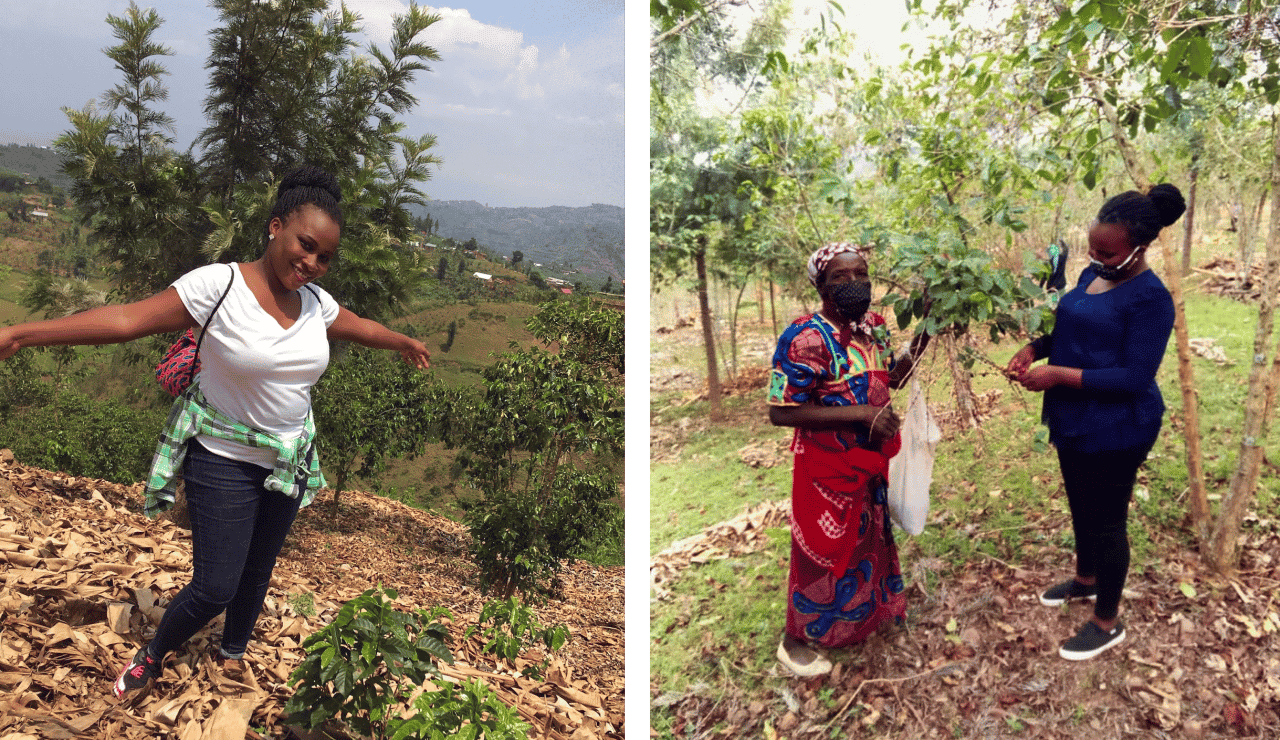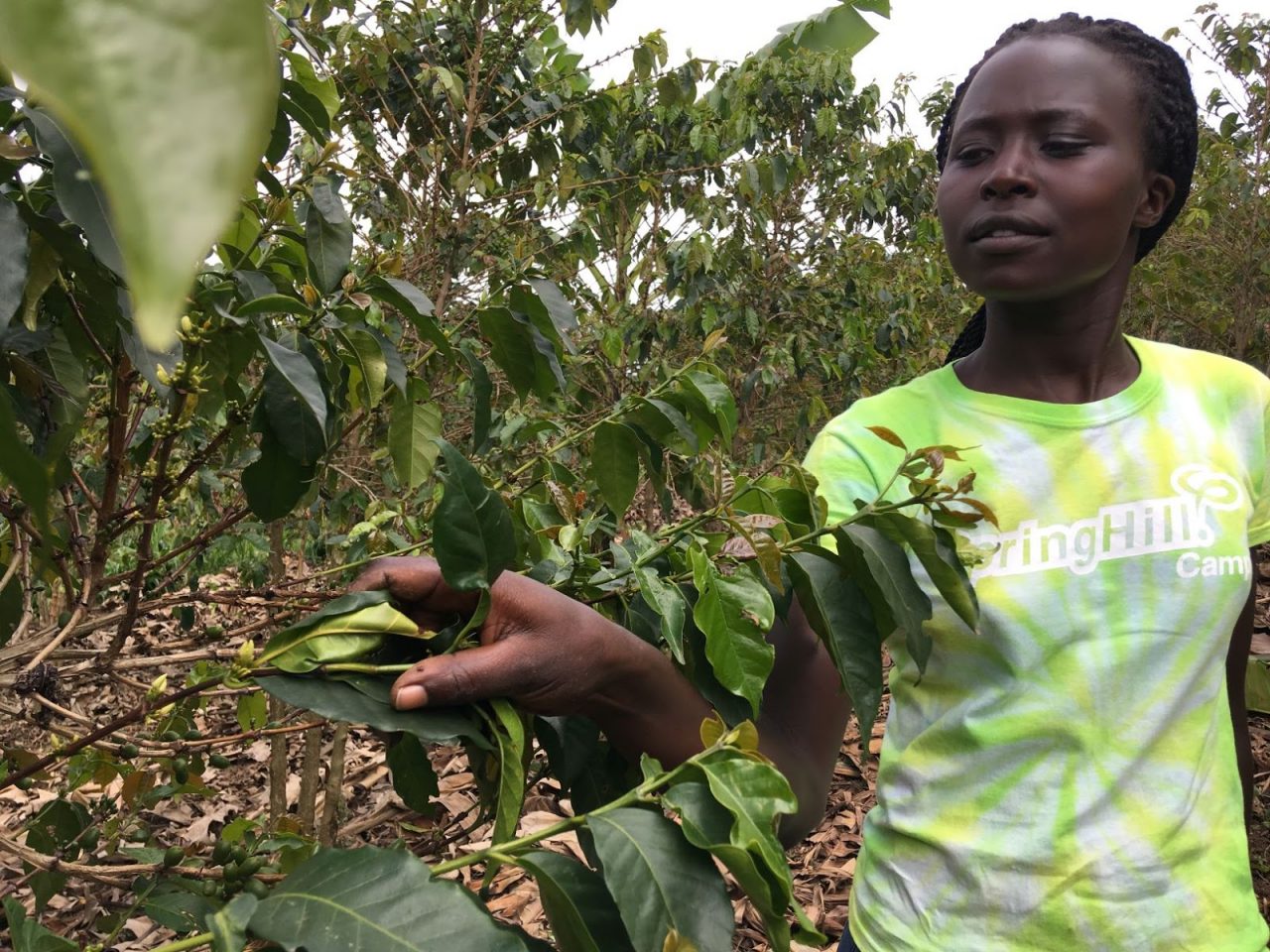Based in the Rutsiro district of Rwanda’s Western Province, Ejo Heza is a women’s cooperative formed in 2011 as a special subset of the parent cooperative Kopakama. Since its inception, the group has grown from 200 members to over 400. These women collectively cultivate two community plots and also maintain their own coffee trees at home. We came to know the Ejo Heza cooperative and eventually purchase their coffee through Ruth Ann Church of Artisan Coffee Imports, and it’s thanks to her that we are able to share this COVID-19 field report.
As is the case for many of our partners, the arrival of the pandemic directly coincided with Rwanda’s peak harvest season, which is March-May. In contrast to its neighboring countries, Rwanda launched an early and efficient response to COVID-19, implementing a strict lockdown, blocking transport between districts, and instituting contact tracing. For these reasons, Rwanda is widely viewed as a success story for Africa. Yet, just as we’re seeing around the world, the repercussions of the lockdown have created equally difficult situations for farmers as the disease itself.
In April Kopakama’s Quality Control Intern, Grace Izerwe conducted phone interviews with Ejo Heza farmers about the challenges they’ve faced due to the lockdown. Then in July she was able to conduct interviews in-person to learn more. Grace is a trained researcher, coffee cupper, roaster, and barista, and she holds a B.S. in Rural Development and Agribusiness from the University of Rwanda. Her interviews identified the cost, availability, and efficiency of labor as the primary challenge in this year’s harvest.
Globally, labor is among the highest components in the cost of production, and in Rwanda that’s even more true. According to a 2015 study by Ruth Ann, labor in Rwanda was estimated to amount to 75% of the total cost of coffee production, and harvesting labor is 36% of that total labor figure. Social distancing and increased daily wages due to perceived danger have not only made labor scarce and harvesting less efficient, but also driven up labor costs, creating an untenable situation for farmers.

Below are a handful of the interviews Grace conducted in April, shared with permission from Ruth Ann Church. All the farmers’ names have been changed to preserve their anonymity. For all of the interviews, see this article on the Artisan Coffee Imports blog.
April Interviews:
Perpetue: “The stay home period is affecting me in harvesting because before I would use 4 workers and now I am using 2 workers because you cannot find those casual laborers to help you. People are staying at home. This means those 2 available workers spend much time in harvesting. Sometimes they do not even finish the harvest of the good cherries before the delivery time set by the buyers.” (660 trees; 3 years as a member of Ejo Heza; 0 children.)
Clementine: “It is not easy with the distancing instructions of allowing only 2 people harvesting on 1 coffee tree at the same time.” (1008 trees; 6 years as a member of Ejo Heza; 3 children.)
Julienne: “The distancing and use of less workers is affecting me particularly as a site collector. Due to the distancing requirement, I am not allowed to get close to the farmers to work together with them on checking the cherries which they have delivered. This takes me more time and makes some losses when I am sorting alone with workers while farmers have already gone back home. The other challenge is the sanitary and hygiene requirements. I have to always buy hand sanitizers, soaps and water to make sure everyone arriving at the site is safe from the coronavirus.” (1030 trees; 4 years as a member of Ejo Heza; 4 children.)
Beatrice: “As many businesses closed, we are not able to invest in harvesting because we lack money to pay workers in this period of lockdown.” (315 trees; 4 years as a member of Ejo Heza; 2 children.)
Peruth: “This lockdown is challenging me in hiring workers. Many are staying home and the available ones cost much money for harvesting.” (1500 trees; 3 years as a member of Ejo Heza; 0 children.)

Now that the lockdown is over and harvest season has past, Ruth Ann reports that most farmers are not too stressed about covid. However the impact of the virus continues to affect the women. In July, Grace conducted a follow up set of interviews. Among the 10 women interviewed, two mentioned having lost their non-coffee income: one is a cook in a school, and the other used to sell banana wine at a local bar. During these difficult times, income from coffee and support from roasters has been a vital lifeline.
July Interviews:
Honorine
“This season was not really good, I have used all the money from my coffee for home needs. After the lockdown ended, I am always afraid of being sick of COVID-19. I have already finished harvesting my coffee plots, in this period, I only come here in Ejo Heza works and we always make the social distancing to make sure we don’t get the virus, this is still a challenge to not socialize with others but God will keep us healthy.” (Since 2011 when the group started, 220 trees, all married children)
Mireille
“This season was not good, I used the money for home needs and paying loans. I kept for paying workers in harvesting period as I am old and always sick, and my husband is in prison. But the last season in 2019 we had good yield and we hope the next one will also be better as the 2 consecutive seasons cannot be all productive. After the lockdown, I am still healthy and will keep protecting my family from the virus, and I thank God the covid-19 cases are not currently present in rural areas, it is only in cities.” (since 2011, 250 trees, all married children)
Pauline
“After the harvesting period, I get money and I used it in home needs and I bought one goat and did savings in our small credit fund. I am happy that the lockdown ended and now we can move from home, the only problem I have now is that our children are staying at home and not going to school as usual.” (since 2011, 500 trees, 2 children)
Jeannette
“This season helped me pay the health insurance for my family and buy one cow. Now I am working in my other crop farms and I am not challenged by this period after the lockdown, I find everything normal as we moved from home.” (New this year, 310 trees, 3 children)
Nadège
“The yield from this season was very low. I used the money for home needs and savings. Even if the lockdown ended, things have not yet come to normal: everything on market for basic needs got very expensive not as before.” (New this year, 300 trees, 5 children)
Filonne
“Even if the production was not good this year, I am happy that as farmers we were paid on time. I used the money for home needs, bought a hen and did savings. Life now is not really good after harvesting and lockdown as I used to sell banana wine, and some businesses are still closed like bars.” (6 years, 200 trees, 6 children)
Patience
“The season ended well for me, I was able to pay the loan I took from the credit saving fund of Ejo Heza to pay school fees for my children and I also used the money for home needs. After the lockdown, even if there is still social distancing, I am adapting to the situation by selling avocados at the local market, and always wear the masks that Kopakama gave me, I have no problem now in my family.” (Since 2011, 240 trees, 6 children)
Françoise
“This season was not good, I am still delivering my coffee cherries in this period and I plan to buy a goat at the end of harvesting, I used the money for home needs and savings. I feel safe after the lockdown as the virus is not present in rural areas, the only challenge is that we are no longer going to church.” (6 years, 300 trees, 2 children)
Rosine
“This season was not good, I used the money for home needs and to buy a hen, at the end of lockdown things are not yet good as we cannot travel as normal and our children are staying at home without studying.” (Since 2011, 270 trees, 6 children)
Aurore
“This season was bad for me, my coffee trees flowered and fallen down, I didn’t get good production, and I used the little money I get for home needs and paying some debts. Even if the lockdown ended I am still struggling because before the Covid-19, I used to work in kitchen at a secondary school near here.” (Since 2011, 320 trees, 2 children)
***
In addition to the pandemic-related challenges the women faced during this year’s harvest, low productivity on the farms—likely due to weather or the natural cyclicity of coffee productivity—contributed to less than favorable outcomes this year. Yet as Ruth Ann notes, “Rwandans are well-accustomed to challenges and how to overcome them.” There is also significant power in coming together as a community, and the cooperative’s efforts to benefit one another, like founding a micro-savings group, help pave the path to resilience and provide much-needed security during difficult times.
Thank you to Ruth Ann and Grace for their contributions to this field report!
